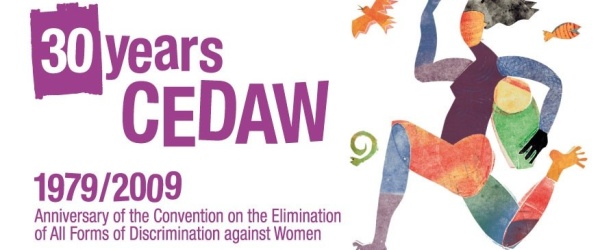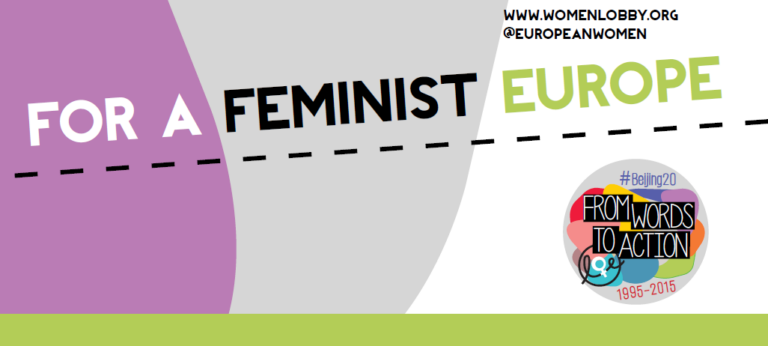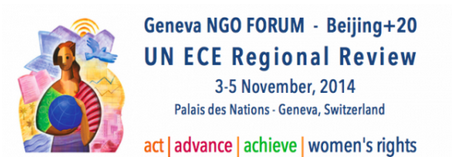[Brussels, 06 July 2011] The Italian Platform “30 years
CEDAW: work in progress”, of which the Italian Coordination of the EWL has is a member, has published a shadow report to the official governmental report submitted on the 2009 30th anniversary of the Convention on the Elimination of All Forms of Discrimination Against Women, signed in 1979. The introduction to the report is below.
CSO engagement in promoting the CEDAW Convention in Italy. The role of the Platform “30 years
CEDAW: work in progress”
On the occasion of the 30th anniversary of the CEDAW Convention MP Giancarla Codrignani described the
day when Italy ratified CEDAW: “Italy ratified the Convention in 1985. The discussion at the Chamber of
Deputies had been scheduled on Monday, when the Parliament is empty. I had to express the approval on
behalf of two left parties: I was furious for the poor political interest in such an important event for women
and decided to take revenge by renouncing to deliver a high content speech and used the time at my
disposal for describing all the characteristics of the act. Some MPs belonging to the Communist and Socialist
parties sitting in front of me showed signs of disapproval and insisted for quickly closing the session. I did
not have fun as I knew my protest was useless. I can now at least remember the episode and share it with
you”.
Since then, Italian institutions haven’t expressed much more interest in the public discussion on the CEDAW
implementation. Women’s indignation and activism has nonetheless raised and many awareness raising and
lobbying activities at local and national level have taken place for promoting women’s rights and including a
gender perspective in policies.
However CEDAW still remains largely neglected, even by experts and local institutions. For this reason we
created a national Platform able to deal with institutions and widely spread information about the
Convention.
The Platform is composed of organizations and experts engaged in research, campaigning and training
activities on women’s rights and the promotion of gender equality in Italy and in international cooperation.
It was created in 2009, on the occasion of the CEDAW 30th anniversary. Since then the Platform has been
promoting the major role the Convention plays in the protection of women’s rights through awareness and
information initiatives.
In December 2009 the Italian Government submitted the 6th Periodic Report to the UN Committee on the
Elimination of All Forms of Discrimination against women2. Some of the organizations belonging to the
Platform have engaged in the drafting of a Shadow Report for highlighting the critical aspects of the Italian
protection system against gender discriminations.
THE ITALIAN GOVERNMENT 6th PERIODIC REPORT
Italy’s 6th Periodic Report aims at presenting to the CEDAW Committee the progress made in implementing
the Convention in the period 2005-2008. As the Report was submitted in December 2009 and the Italian
Government sent some additional information to the Committee last March, following some Critical Issues
raised by the Committee during the Pre-session, the Report covers also the period 2009-2011.
THE CSO SHADOW REPORT
The Shadow Report is an important tool for spreading information and highlighting the main challenges
faced by women in Italy in their empowerment processes and the enjoyment of human rights.
The document includes an analysis of the main issues identified by the authors, who every day promote
gender equality and equal opportunities through their professional and voluntary commitment.
The Report is the result of a wide consultation with civil society organizations, feminist and women’s
associations, LGBTQI movements and experts on gender discrimination. It includes the suggestions and
experience of the main organizations engaged in the promotion of women’s right in Italy.
In the period 2005-2009 little progress was registered in the status of Italian women.
Poor attention was paid to domestic violence and rapes committed by migrants in public places (few
numbers compared to domestic sexual violence) were politically instrumental to the adoption of repressive
immigration laws. This led to many demonstrations in 2007 for asking investments and structural interventions for the prevention of violence and the promotion of gender equality through the elimination
of gender stereotypes which are the roots of gender-based violence and more broadly of the
underrepresentation of women in the economic, political, social and cultural life.
The Shadow Reports outlines that women’s access to work and reproductive health didn’t improve in that
period.
In recent years the Ministry for Equal Opportunities showed growing attention to gender-based violence
and adopted legislative reforms neglected for years by the Parliament: we welcome the adoption of the Act
on stalking and the adoption of the Antiviolence and UNSCR 1325 National Plans as examples of the
Ministry engagement on the issue.
Nonetheless besides these reforms no concrete political will to strategically face the cultural cause of
violence and the poor presence of women in decision-making processes was shown. This hinders
improvements in women’s rights protection and promotion.
The Government itself recognizes in the Periodic Report that deeply rooted gender stereotypes in our
country are the most important obstacle to women’s empowerment and equal opportunities.
Since 2005 no will to try to modify the stereotyped image of women in the media has been noticed. The
political debate has contributed to a decline in this sense through frequent sexual references and
stereotyped expressions on the role of women in society. Machos attitudes are widely tolerated also in the
public sphere and have contributed to women giving up actively participating in social, economic political
and cultural life, as they are aware of the difficulties they could face in pursuing a career of any type on the
basis of their capacities.
The absence of an independent body devoted to gender discrimination and gender-based violence
contributes to worsen the difficulties encountered by Italian institutions in defining effective long-term
strategies for deconstructing gender stereotypes.
Since 2005 the Italian equal opportunities system has been characterized by a complex functioning and the
lack of a homogeneous mission. The Ministry of Equal Opportunities is a ministry without portfolio and is
therefore economically dependent on the Government. Powers of Minister are delegated by the Prime
Minister and the responsibilities are shared among different ministries and a bunch of equal opportunities
bodies at the local and national level. Those bodies are often insufficiently funded to carry out proper
interventions and appointed by the government.
Civil society could undoubtedly give a strategic contribution to the necessary constitution of an
independent body responsible for the promotion and protection of human rights, in line with the Paris
principles and the Recommendations formulated by the six Committees that have examined Italy’s Reports
in the last years. This institution should of course include a specific body responsible for monitoring the
promotion and protection of women’s rights.
The respect of the Convention’s principles in implementing actions for promoting gender equality and a
greater involvement of civil society organizations could bring remarkable improvements in the future.
Download the full shadow report in PDF format:
italy shadow report cedaw 2011 stand
Attached documents



